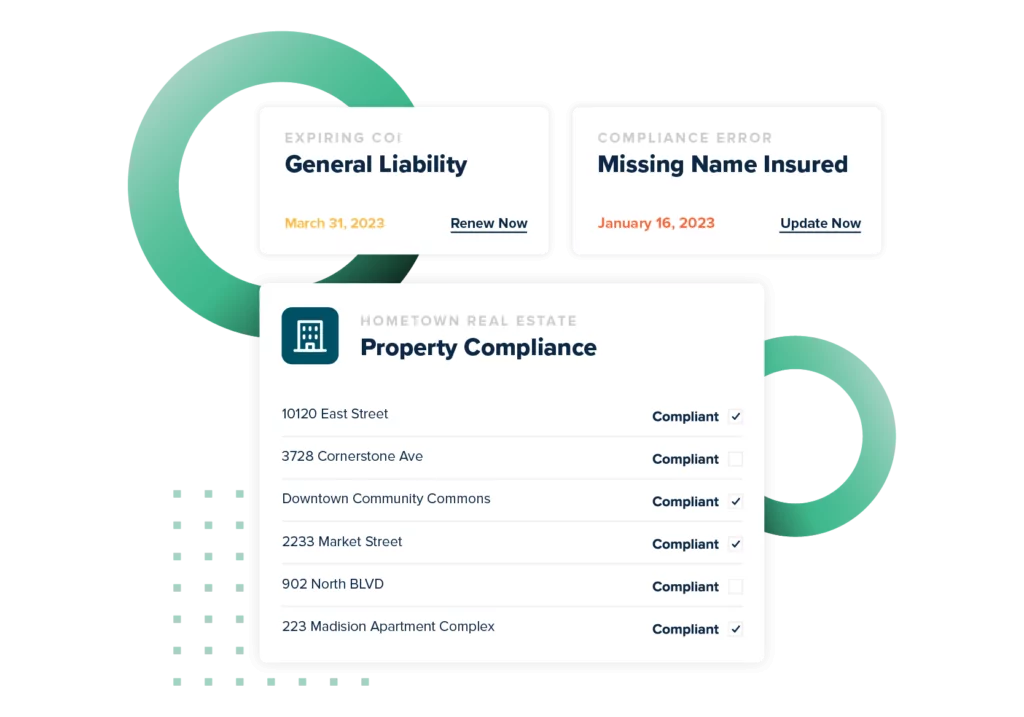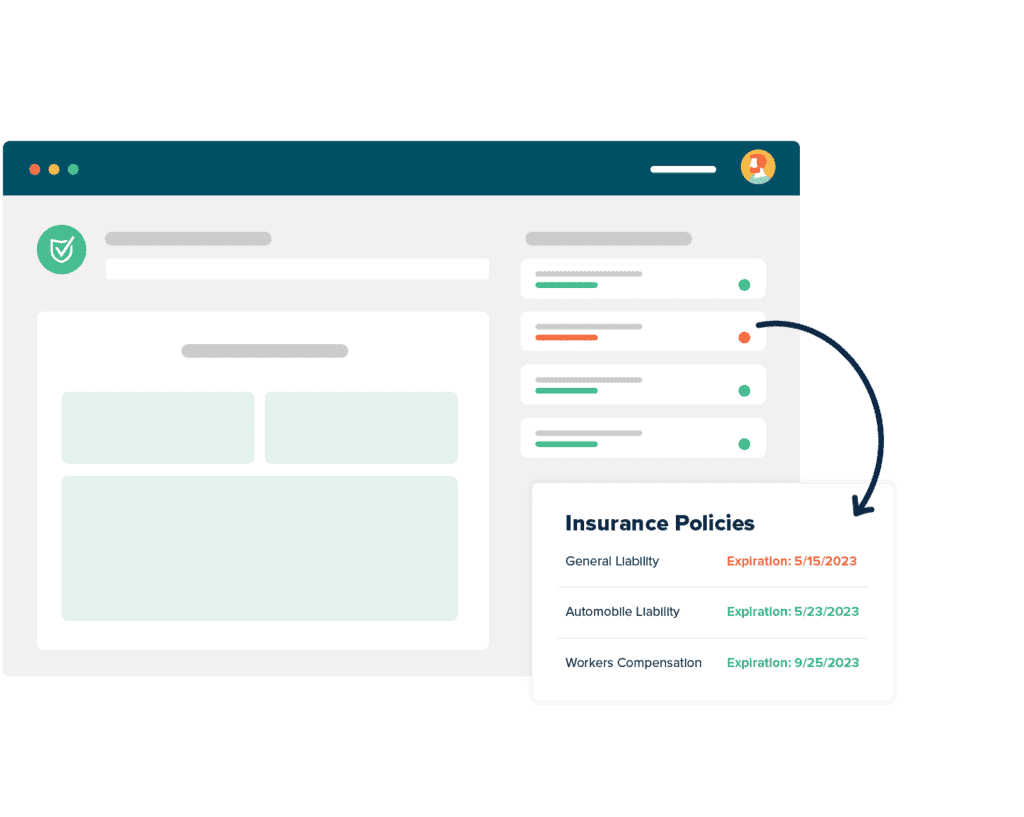Best Certificate of Insurance Tracking Software

Protect Your Business From Costly Claims
Ask your CFO or Risk Manager just how much claims and lawsuits can cost your business. If you are collecting certificates just to confirm they were received, you have no guarantee that your requirements are being met. myCOI Central is built on a foundation of insurance industry logic to ensure you remain protected with the appropriate coverage.
Automate Your COI Tracking
There’s no more need to worry about stacks of certificates cluttering up your office or hours of frustrating phone calls and emails to chase down certificates. myCOI Central provides your company with a solution to automate your insurance certificate requests, collection, and compliance resolution, while also giving your team a single, centralized repository to view compliance.


For Agents & Brokers
Win business and boost retention by providing agency branded, industry leading insurance tracking software to your insureds. Offer software only or add on your own compliance review services.
What Are The Benefits of COI Software?
View all CasesGC Certificate Of Insurance Tracking App
If you are a general contractor then GC certificate of insurance tracking apps are something you’re going to deal with at some point. It may be because you’re hiring a lot of subcontractors, and you need a method to track the certificate of insurance you require from them. Or it could be because you work with businesses that use certificate of insurance tracking software to manage the certificates of insurance that you provide to them.
It’s almost a certainty, and the probability of it being a certainty that you will deal with such technology climbs every day. For years anyone who tracks certificates of insurance best practices has been noting the importance of an automated certificate of insurance tracking app solution.
myCOI is the industry-leading certificate of insurance tracking solution, in a self-service SaaS solution as well as a concierge, managed service solution. We pioneered the COI tracking industry, you might say. And our team of insurance specialists, coupled with our commitment to customer service, makes us unmatched.
The risks of not tracking your certificates of insurance, or tracking them poorly, are almost too numerous to count, but most of them boil down to risk. Insurance risk not handled properly can open you to enormous potential responsibilities. If you’re not navigating the web of overlapping coverage, exclusions, limitations, additional insureds, and sometimes just basic human error that can easily exist in business relationships, you’re risking being held responsible for claims or damages that you should not be.
Anyone can download a certificate of insurance template and fill it in, make it look presentable, and deliver it to a requestor. Yes, that’s dishonest and oftentimes illegal but it happens. Can your contracting business absorb the risk of not tracking for things like that? Or hiring full-time staff to hand-verify each one?
If you can’t, then an insurance tracking app may be a smart move.
Best Certificate Of Insurance Tracking Software
The competition for best certificate of insurance tracking software is fierce, and we’d be being dishonest if we didn’t say you need to choose the right solution for your company. Obviously, at myCOI we believe we are the right solution nine times out of ten, but we don’t fit every company, and that’s okay. Certificate tracking is a critical part of your business no matter what solution you use, whether that’s a full managed partner solution or a simple COI tracking spreadsheet.
You’ll need to define what “best” means for your business. Is it the least expensive? That depends on how you measure cost. In pure dollars, a free COI tracking software may work, but is it reliable? Do its developers offer support? Are there regular product updates coming out? If not, check it carefully to make sure it isn’t out of date.
Is “best” the least of your precious person-hours consumed by tracking certificates of insurance? Then a managed solution like myCOI offers may be best. Our team of insurance professionals know what they’re looking at, and they’re experts in making sure your certificates are promising what they say they do, that they meet your business requirements for coverage, and our quarterly verification makes sure the coverage stays in effect.
myCOI users routinely report both expense savings and time savings that they can reinvest back into their business, as well as improved vendor or contractor compliance ratings.
Certificates Of Insurance Issues And Answers
We know this can be a complicated topic because we get asked about certificate of insurance issues and answers all the time. Insurance is a complicated field with nuances around every corner, and almost every situation has some kind of unique aspect. Understanding coverage, understanding what the certificates of insurance actually say—and what they don’t say—can be, and often is, a full-time job.
There are two parties you want to check within almost any instance of questions around certificates of insurance. First, for questions like which vendors need a certificate of insurance, check with your company’s risk management department, or when that doesn’t exist, your company’s general counsel about what your vendor insurance requirements are. In many cases, these departments or people can give you a certificate of insurance review checklist to help you ensure that the COIs you review have all the necessary coverage.
The other party will be the agent who issued the certificate of insurance. When you have questions about the coverage, exclusions, or limitations shown on a certificate of insurance you receive, the only safe source of information is the insurer itself. Don’t ask the third party who provided you with the certificate; not only does this give them the opportunity to be dishonest, it also sets you up to be taken advantage of out of ignorance or a mistaken belief about coverage. Go to the source. Ask the insurer. Certificate of insurance compliance is complicated enough without adding more chances for mistakes.
Certificate Of Insurance Online
Knowing how to get insurance certificate online is a good way to make your insurance activities more efficient. You can often request a certificate of insurance online at your insurer’s website. How long it will take to receive it once you request it is a question only your insurer can answer, but most insurers have found ways to keep such requests to a reasonable timeline.
Always be sure, though, to request certificates only from your insurer. Don’t fall prey to websites that offer to “do it for you.” Your insurance coverage, and the protection you get from it, are a relationship you have with your insurer. Don’t trust other intermediaries to get it right. It’s your business. Be careful with it.
You may also find it handy to keep a certificate of insurance sample handy for when you need it in a hurry. Sometimes you just need to prove that you have insurance, even if you’ll need to modify your coverage to suit the specific needs of the relationship you’re entering.,
And, as always, keep close to certificate of insurance requirements by state. Each state determines its own insurance statutes, and they vary from state to state, so if you’re working across state lines or in a new state, you’ll want to be ready.
Which Vendors Need A Certificate Of Insurance
If you’re a contractor or business asking which vendors need a certificate of insurance, the answer is pretty simple: any vendor that enters your business premises and takes any actions that may generate any risk at all needs to give you a certificate of insurance.
That sounds pretty vague, we know, but it’s a simple reality. Risk exists all around us, whether we generate it or not, and the last thing you want to do is assume the burden of risk your vendor opened you to because you failed to secure a certificate of insurance.
Now you may ask “what is a certificate of insurance for vendors?” and the answer is, the same thing you provide to other entities that you do work on behalf of. It should show the vendor’s coverage, any limitations or exclusions, and all the usual information.
Knowing how to request a certificate of insurance from a vendor likely comes down to how your business works with vendors. In many cases, COIs with the required coverages are required as part of the vendor application process or were specified in the RFP. If not, it’s often a requirement before the vendor can begin working.
Certificates Of Insurance For Subcontractors
If you’re a subcontractor, or you hire subcontractors and have to track the certificates of insurance you receive from them, you may see a few oddities. Depending on what state you’re working in, certificates of insurance for subcontractors may sometimes lack evidence of workers’ compensation coverage. This is because several states do not require workers’ compensation coverage for what are called sole proprietorships, where the individual worker is the only employee of their one-person company. If you’re unsure whether or not there should be a workers comp policy by statute, consult with your state’s workers compensation board.
Even in states where it is not legally required, however, many companies that hire subcontractors still require the coverage as a necessity for employment. In that case, a workers’ compensation certificates of insurance for subcontractors will show the minimum necessary coverage required by the hiring entity.
What’s fun about these one-person plans is that often they’re what are called ghost policies: they are workers’ compensation plans, but they have exclusions disallowing coverage for the single employee. They allow subcontractors to satisfy the requirement of needing workers’ compensation, but since they are excluded, the coverage only covers a ghost.
Or in reality, no one.
Certificates Of Insurance 101
Let’s take a moment and run through certificates of insurance 101. In its most simple form, a certificate of insurance is the evidence from your insurer that you carry the insurance you claim to carry. The normal forms include all the necessary information a requestor would need to verify that you or your business carry the insurance they require of their contracted entities. Just like your driver’s license says your state believes you know how to drive safely, so a certificate of insurance says your insurer believes you are covered.
There are nuances, of course. The certificate of insurance for businesses may be different, and will almost certainly carry different information, than the certificate of insurance for contractors, because the work done, the number of employees involved, and therefore the risk involved, can be different.
A certificate of insurance also removes the need for unnecessary conversations. If you’re being considered for a job, competing on the bid is enough work. Not having to explain your insurance coverage, because your certificate of insurance explained it for you, can be a real time saver.
And as we said above, if you’re a business that receives them, organizing certificates of insurance is a critical task that can sometimes mean life or death to your company.